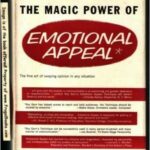The desire for recognition exists in every person and every company. When we complete a task or project we hope for some appreciation and recognition for our efforts. Then, if it is not forthcoming, we feel hurt since our desire for recognition has been by-passed.
If a person craves recognition and you give it to them, they will like you and bend over backwards to help you. However, if you make them look bad or take credit for what they did, watch out.
Mary Kay was the master of recognition and it propelled her company to greatness as we discussed in a previous blog called “Recognition on Steroids.” By contrast, the lack of recognition when it is due can create a Benedict Arnold as we discussed in a previous blog called “Recognition or Doom.”
According to Roy Garn, in his groundbreaking book, “The Magic Power of Emotional Appeal,” the secret to making people like and pay attention to you, especially with people that crave recognition, is to make them feel a sense of importance. The simple act of active listening can make the other person feel more important. Show them you are interested in their troubles, their children, and their success. They will love this attention and pay you back in spades.
However, rather than make the other person feel more important, many people choose instead to play the sympathy card and complain about their health or some bad luck they had. They make the conversation about themselves, denying the other party the ability to fulfill their desire for recognition. Everyone has health issues and hard luck stories.
Recognition can also come from meeting a challenge. For example, there is a story I think that came from Tom Peter’s book, “In Search of Excellence,” where a factory owner wanted to get the most out of his workers. He asked the day shift to produce as many widgets as they could. At the end of the day, he wrote in chalk on the floor by the employee entrance the number 8 since the day shift produced 8 widgets. When the night shift arrived, they saw the number 8 and asked what it meant. They were told that the day shift produced 8 widgets. The next morning, when the owner returned to work, his 8 was erased and the number 9 was written in its place by the night crew. Surely the night crew went home feeling very important that day.
Most of us like to find fault in others. When we belittle others, we attempt to inflate our own feelings of importance. However, if we regularly and unduly seek out and comment upon the faults of others, we are seen as lacking confidence in ourselves and are frequently ignored.
How can you use the emotional appeal of recognition to make your customers feel more important and thereby focus on your marketing message?
Before you leave the topic of emotional appeals, be sure to check out the other 3 emotional appeals, Roy Garn discusses in, “The Magic Power of Emotional Appeal:” money, self-protection, and romance.












